9 Best Weight-Loss Teas, According to Nutritionists

If you’re trying to shed pounds, you’re probably well aware that you’ll need to avoid sugary drinks like soda, processed juices, and specialty coffee drinks (we’re looking at you, Frappucinos!). But you may not realize that certain beverages can actually assist your goal to lose weight. One of the best examples of this is tea, thanks to many varieties’ high concentrations of antioxidants and vitamins. With this in mind, we spoke to nutritionists to get their picks for the best weight-loss tea. Read on for nine options you’ll want to get steeping right away.
RELATED: 8 Health Benefits of Drinking Cranberry Juice, According to Doctors.
1
Green Tea
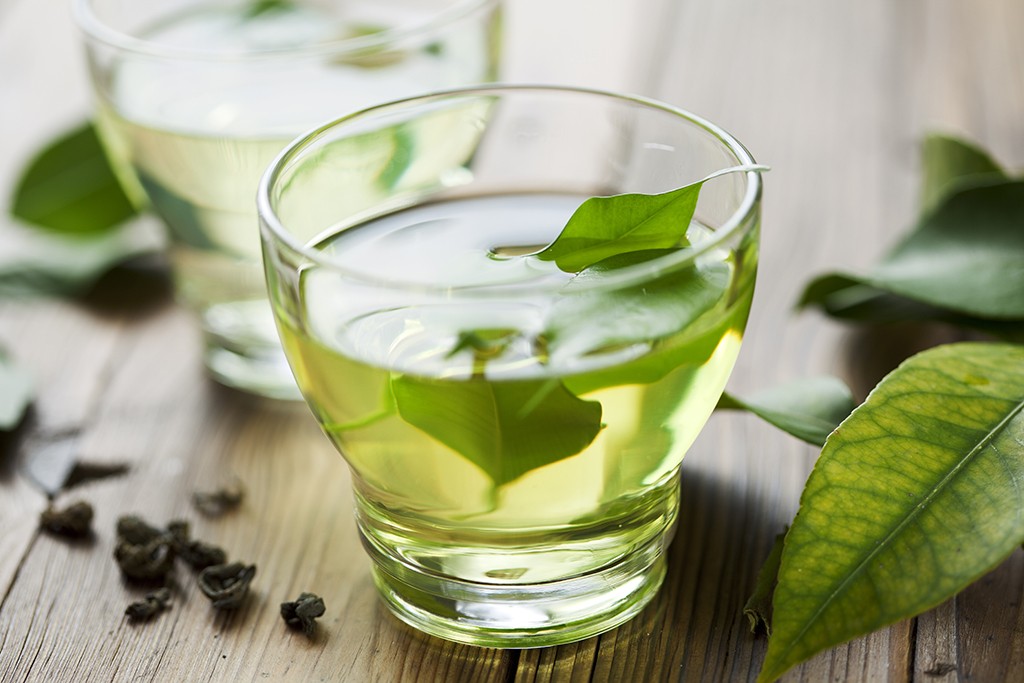
Studies on green tea have verified its health benefits for everything from cognitive function to heart disease. But it doesn’t end there: According to the experts we spoke with, green tea is also the most recommended tea for weight loss.
“Green tea contains high levels of antioxidants known as catechins, particularly epigallocatechin gallate (EGCG), unique to green tea,” explains Michelle Routhenstein, RD, preventive cardiology dietitian at Entirely Nourished. “It’s thought that EGCG, coupled with a balanced diet and regular exercise, can help boost metabolism, facilitate fat oxidation, and improve insulin sensitivity to help achieve weight loss goals.”
Nichole Dandrea-Russert, RDN, plant-based dietitian at purelyplanted, points to a 2004 study published in the Journal of Health Science, which concluded that the catechins in green tea, when present during exercise, increased “body fat utilization for energy expenditure” and, therefore, led to reduced body fat.
“Green tea also contains the amino acid L-theanine, which has been shown to promote relaxation and improve sleep, both of which may support healthy metabolism,” Dandrea-Russert adds.
Finally, a 2020 meta-analysis of 31 studies, including 3,321 subjects, found that drinking green tea “significantly” lowered total cholesterol and LDL (“bad”) cholesterol.
Routhenstein notes that these benefits can be found in both caffeinated and decaffeinated varieties of green tea.
2
Lemon-Ginger Tea
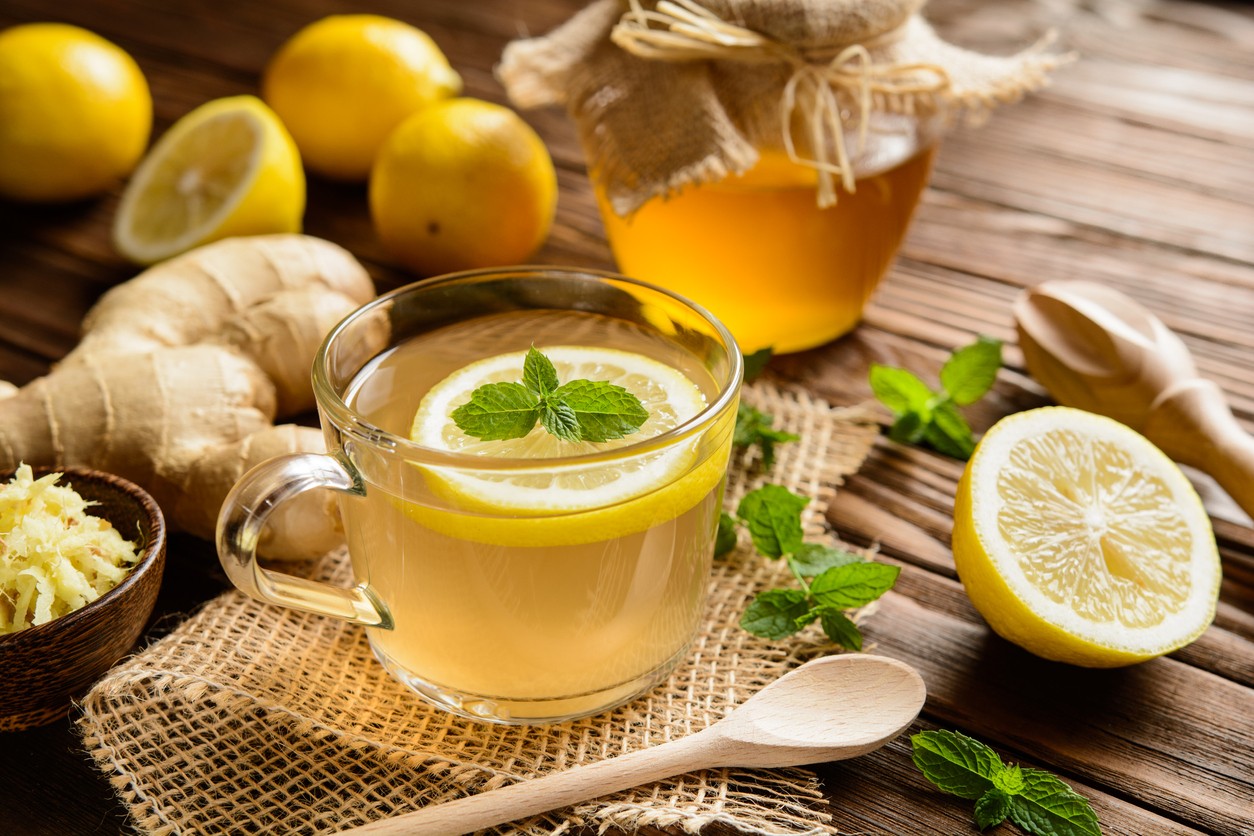
The next most recommended weight-loss tea is a lemon-ginger combination.
“Ginger root stimulates digestion and reduces inflammation to support a healthy metabolism on multiple fronts,” shares Rachael Richardson, registered dietitian and licensed nutritionist at Nutrolution.
Chloë Ward, founder and functional diagnostic nutrition practitioner at One Healthy Meal At a Time, adds that “gingerol, the active compound in ginger, has thermogenic properties that can increase calorie expenditure and aid in fat loss.”
Gingerol also aids in “efficient digestion, so food doesn’t linger as long in the gut,” according to Johns Hopkins Medicine.
“Lemon adds vitamin C and acidity, which may further enhance metabolism and digestion,” notes Ward.
She suggests simply steeping fresh ginger slices and lemon juice in hot water, or you you can let the tea cool in the fridge and serve it over ice on a hot day, as Richardson recommends.
3
Pu-erh Tea
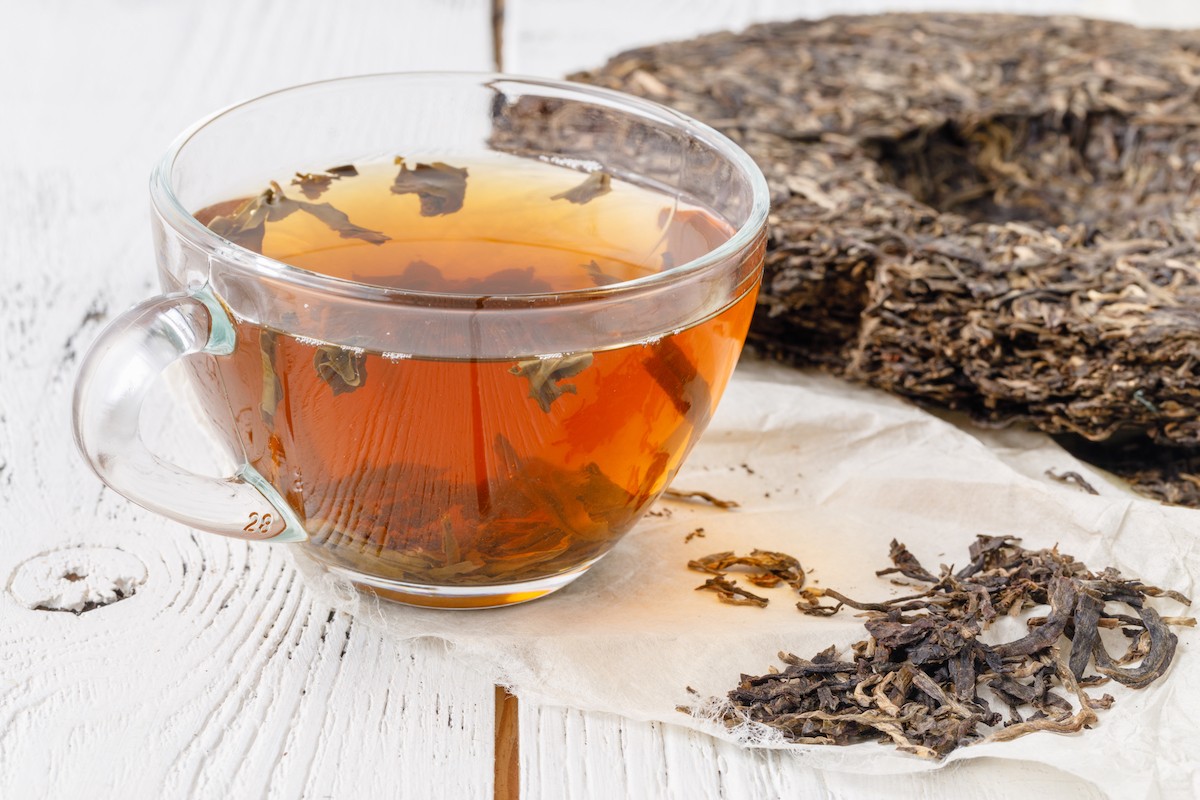
Pu-erh tea comes from the Yunnan Province of China, as well as Taiwan. It’s a “fermented tea made from the same plant as green, oolong, and black teas,” says Colette Micko, MS, RDN, CDES, a registered dietitian at Top Nutrition Coaching.
Dandrea-Russert notes that Pu-erh tea has long been used in traditional Chinese medicine for its cholesterol-lowering effects, but some recent research suggests that it can also “facilitate lipid metabolism and weight loss.”
“While the mechanism isn’t fully understood, some experts believe it may be due to a compound called theabrownin, which works via the liver-gut axis,” Dandrea-Russert explains. “Other experts believe it may be due to the gallic acid in pu-erh tea that activates fat-metabolizing enzymes.”
In a 2011 study published in the journal Nutrition Research that looked at the gallic acid content, subjects who consumed pu-erh tea extract versus a placebo “exhibited significant effects in reducing the mean waist circumference, BMI, and visceral fat values.”
4
Oolong Tea
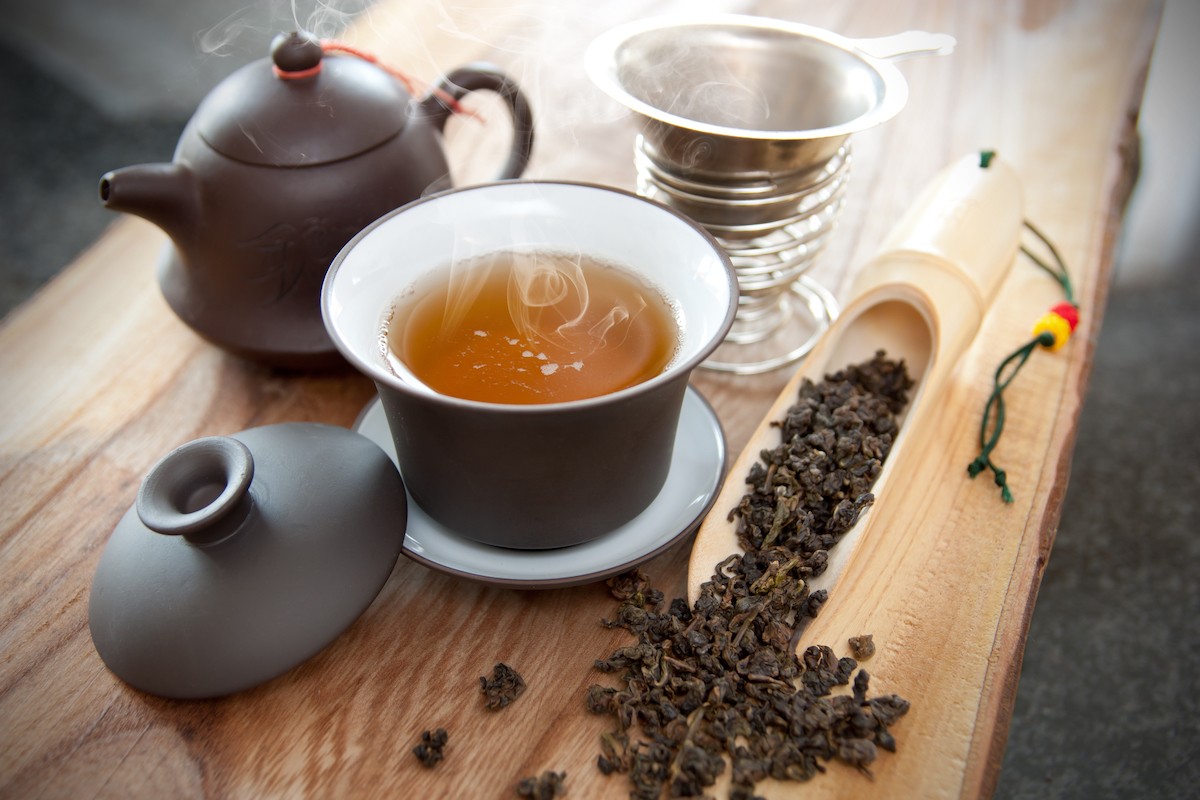
According to The Tea Spot, oolong is a partially oxidized tea, which sets it apart from unoxidized green tea and fully oxidized black tea.
“Oolong’s partial oxidation gives it a distinctive flavor profile that falls somewhere between green tea’s freshness and black tea’s robustness, with a smooth, mellow, and slightly sweet taste,” they explain.
If you enjoy this flavor and are also looking for a weight-loss tea, you’re in luck, as Dandrea-Russert points out that oolong contains the same catechins as green tea.
“One study showed that men and women who drank oolong tea daily for six weeks lost body fat weight while also seeing improvements in their triglyceride and cholesterol levels,” she explains. “The researchers believe that the catechins found in oolong tea may support weight management by improving lipid metabolism.”
RELATED: Akkermansia Is Being Called a Game-Changer for Weight Loss.
5
Cinnamon Tea
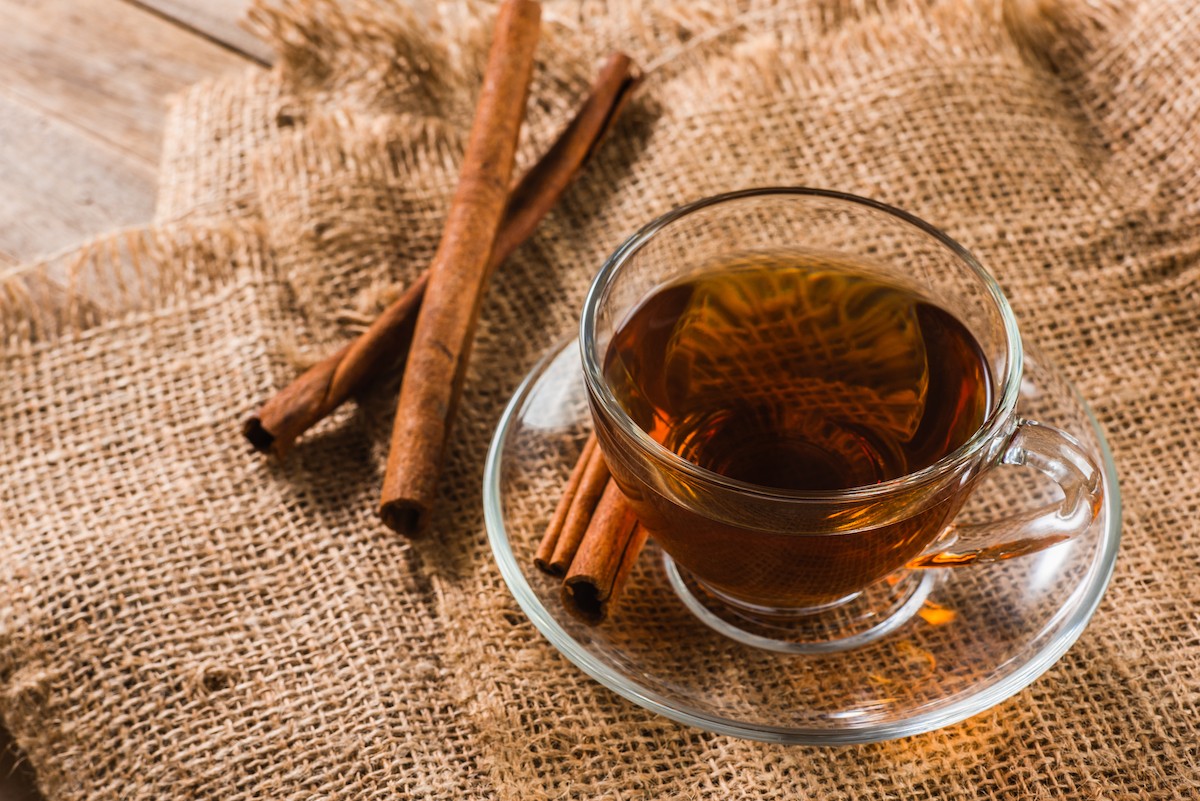
To enjoy this weight-loss tea, simply steep cinnamon bark in hot water, suggests Ward.
“Cinnamon contains compounds like cinnamaldehyde and cinnamic acid, which have been studied for their potential to regulate blood sugar levels and improve insulin sensitivity,” she shares. “By stabilizing blood sugar levels, cinnamon tea can help reduce cravings and support weight loss goals, particularly for individuals with insulin resistance or type 2 diabetes.”
In fact, a 2020 study published in the journal Clinical Nutrition concluded that cinnamon “could be recommended as a weight-reducing supplement in obesity management.”
6
Earl Grey Tea
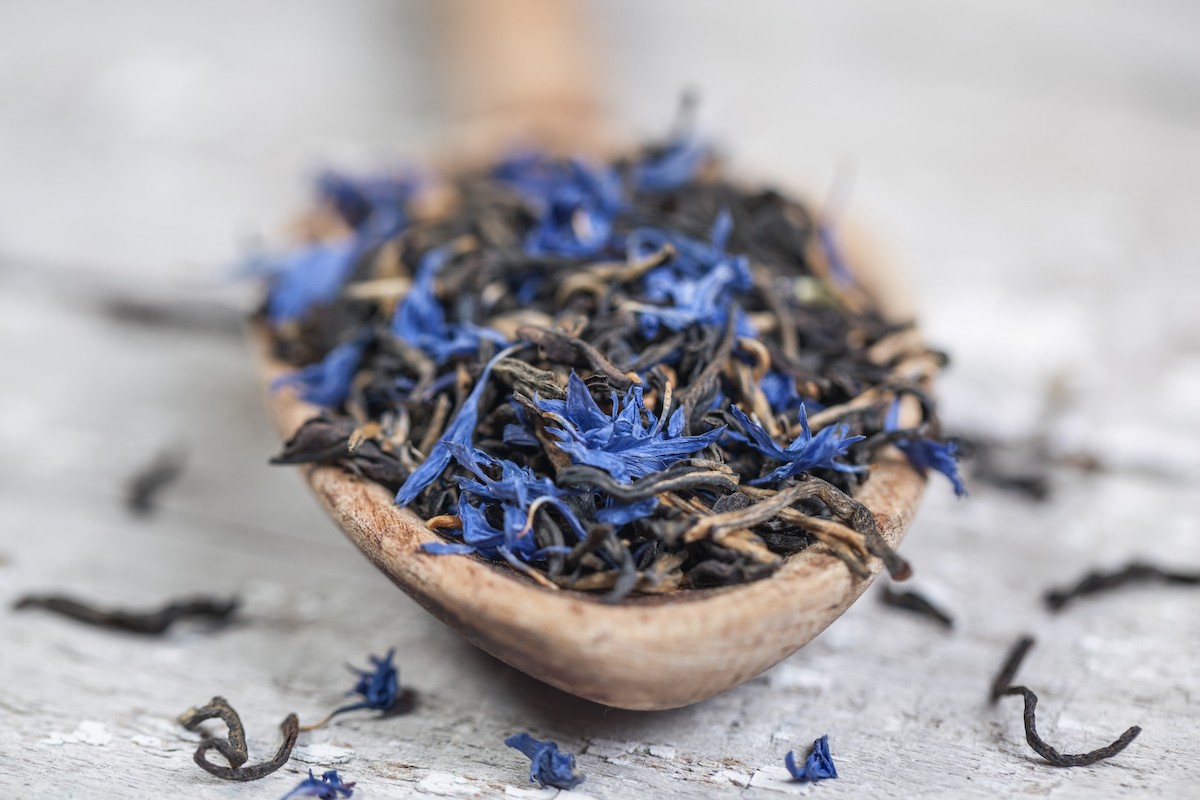
Earl Grey is a black tea that gets its unique flavor from the addition of bergamot oil, “which gives it a distinctive citrusy aroma and flavor,” notes Ward.
On its own, “black tea contains caffeine and flavonoids that can boost metabolism and promote fat burning,” she explains.
According to the scientific journal Molecules, flavonoids are natural compounds that “possess a number of medicinal benefits, including anticancer, antioxidant, anti-inflammatory, and antiviral properties.”
And what makes Earl Grey tea so weight-loss friendly is that bergamot contains additional flavonoids. One study found that bergamot helps to reduce visceral fat, while another concluded that it “could benefit lipid metabolism and weight management in old adults with dyslipidemia.”
“The bergamot oil in Earl Grey may also have mood-enhancing effects, helping to reduce emotional eating and support weight loss efforts,” adds Ward.
RELATED: This Food Can Trigger a 15% BMI Weight Loss—But You’re Probably Not Eating It.
7
Mint Tea
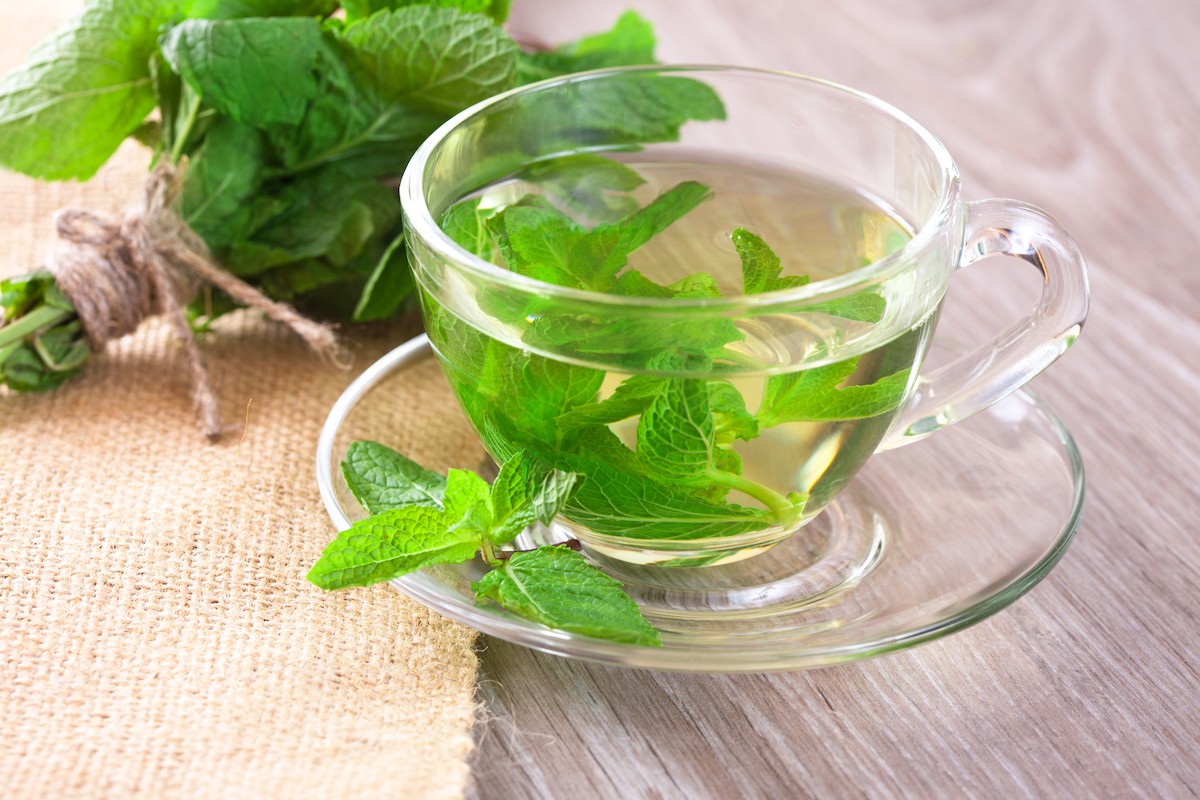
Whether you steep fresh or dried mint leaves or choose peppermint, spearmint, or another mint variety, you’ll still get the same weight-loss effects from the herb’s menthol content.
“Menthol can help suppress appetite and reduce cravings, particularly for sweet or high-calorie foods,” says Ward. “Mint tea is also naturally caffeine-free and low in calories, making it a guilt-free beverage choice for those watching their weight.”
Moreover, as Best Life previously reported, peppermint tea is “high in flavonoids, antioxidants that are known to reduce inflammation, relax the gut, and balance your gut bacteria.” This can help relieve bloating and gas.
RELATED: 10 Best Foods to Eat in the Morning for a Faster Metabolism, Nutritionists Say.
8
Adaptogen Tea
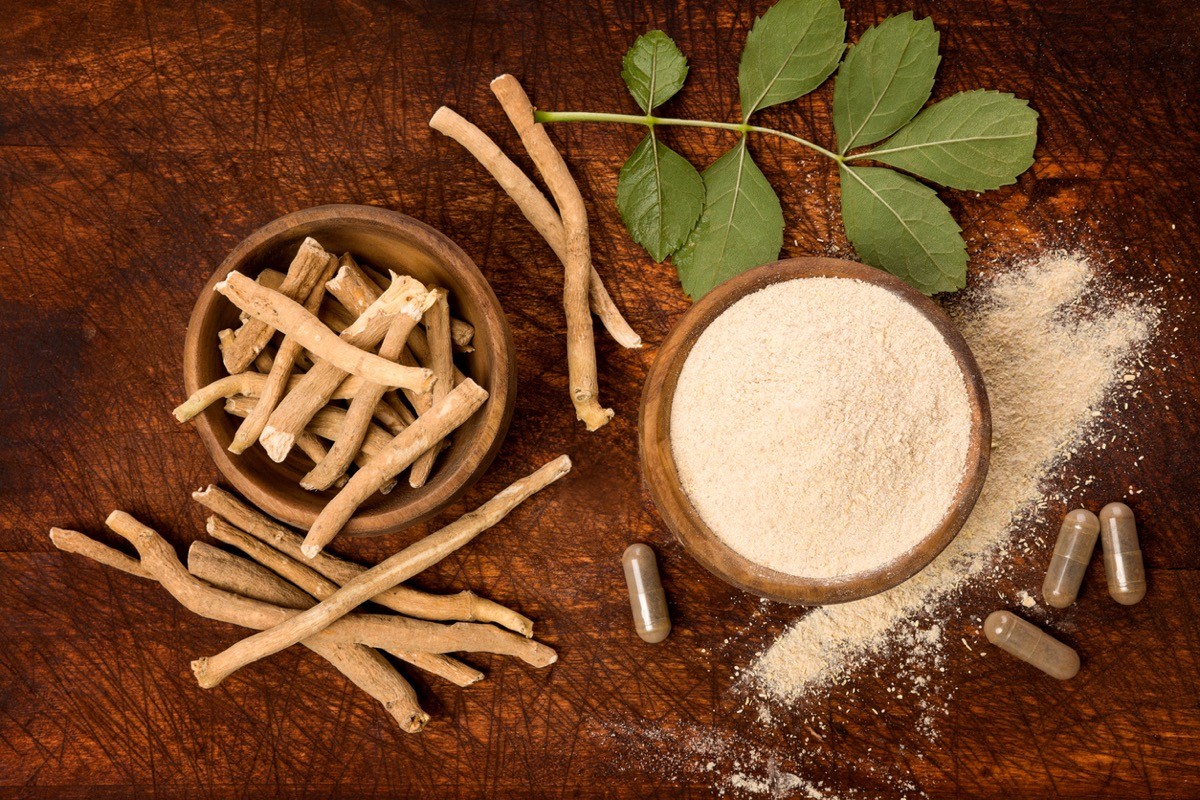
Dandrea-Russert notes that true “tea” comes from the Camellia sinensis plant, and adaptogens instead are “a class of herbs, roots, and other plant substances.” However, she says they may still “indirectly help with metabolism.”
“Adaptogens are believed to help the body’s resilience in dealing with physical and emotional stresses,” she explains. “Chronic stress can wreak havoc on the body, including metabolism, by interrupting sleep and increasing stress hormones like cortisol. Incorporating adaptogenic tea daily may support your body’s response in dealing with stress, which may assist with sleep and keep stress at bay, both of which may help with metabolism.”
“Examples of calming adaptogens that can be consumed as tea include ashwagandha, holy basil, and rhodiola,” she shares.
RELATED: I Tried Liquid I.V. Hydration for Two Weeks & Noticed 4 Changes to My Body.
9
Matcha
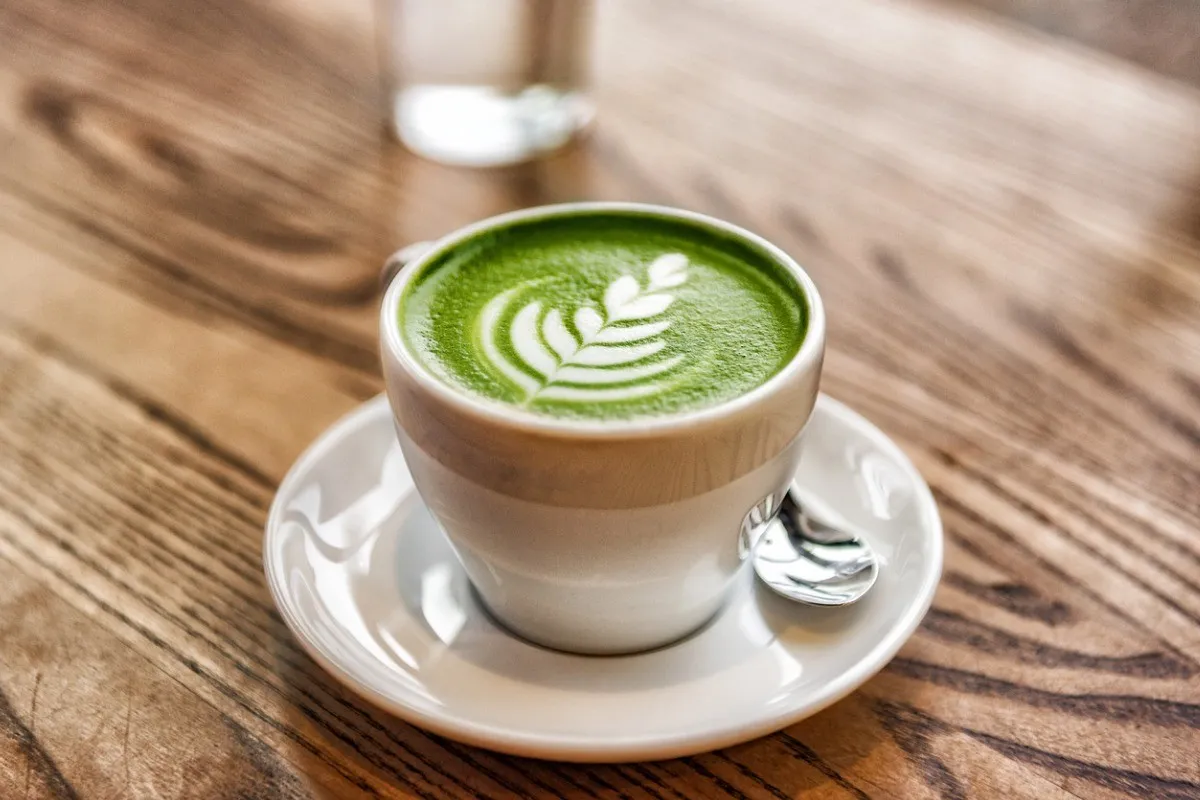
Like green tea, matcha is made from the Camellia sinensis plant. However, matcha is grown in the shade for two to four weeks, “which increases the caffeine and L-theanine levels in the tea leaves,” explains David’s Tea. “The leaves are then steamed, dried, deveined and carefully ground to a fine green powder.”
The health benefits of matcha are many, including reduced inflammation, better brain and heart health, and even cancer prevention. It’s also known to aid in weight loss.
“Matcha contains up to 10 times the amount of polyphenols than green tea,” Kiran Campbell, registered dietitian and founder of Kiran Campbell Nutrition, previously explained to Best Life. “Studies show that EGCG [Epigallocatechin Gallate, a powerful compound found in green tea] may help reduce overall weight and waist circumference by decreasing hormones that make you feel hungry.”
Remember to consume weight-loss tea safely.
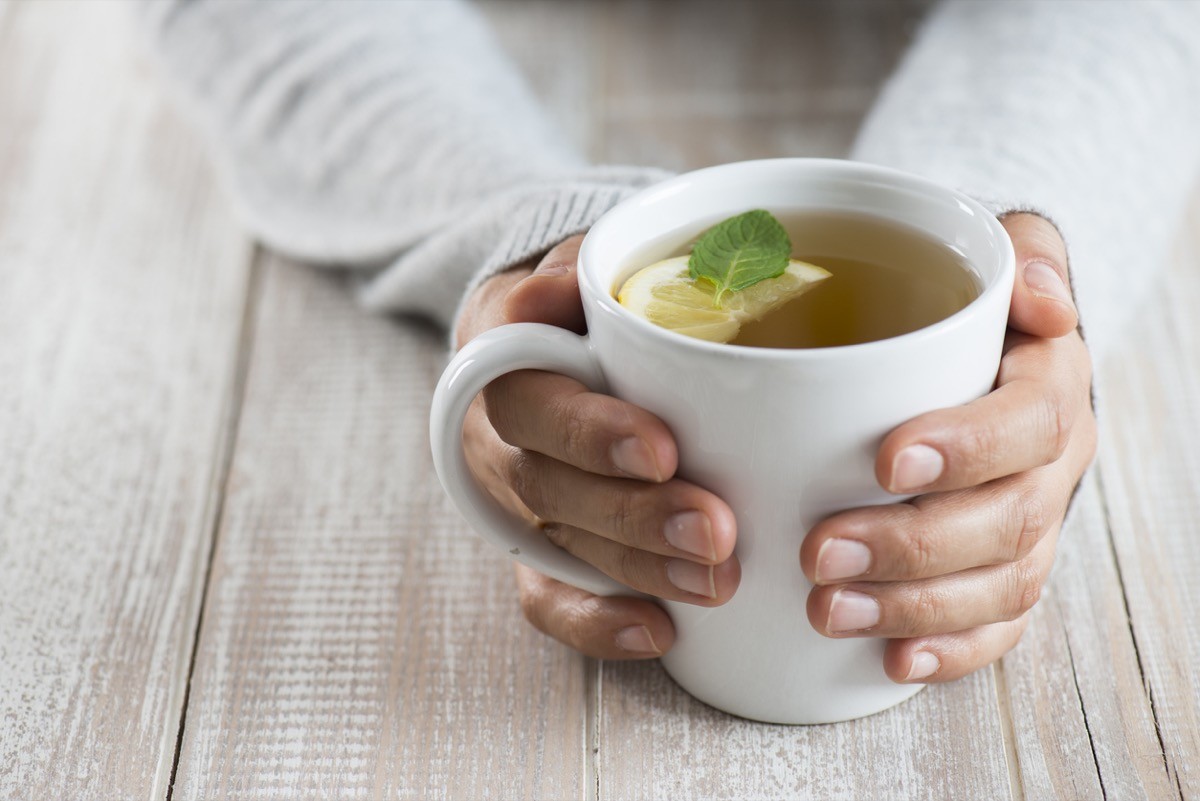
If you’re considering adding a weight-loss tea to your diet, it’s important to know the difference between a natural tea like those listed above and a tea that is engineered to aid in weight loss.
According to registered dietitian Marie Spano, MS, RD, CSCS, CSSD, a Dymatize nutrition consultant, the latter “often contain laxatives and diuretics.”
Dandrea-Russert notes that you’ll want to be conscious of tea’s caffeine content if you’re sensitive to this so as not to overdo it.
“Drinking tea alone will likely not result in weight loss, but as a compliment to a well-balanced diet, it can aid in efforts,” adds Micko.
- Source: BMC Geriatrics: Association between tea consumption and cognitive impairment in middle-aged and older adults
- Source: Nutrition, Metabolism and Cardiovascular Diseases: A comprehensive overview on the effects of green tea on anthropometric measures, blood pressure, glycemic and lipidemic status
- Source: Journal of Health Science: Effects of Combination of Regular Exercise and Tea Catechins Intake on Energy Expenditure in Humans
- Source: Journal of the American College of Nutrition: 30 CrossRef citations to date 779 Altmetric REVIEWS In Search of a Safe Natural Sleep Aid
- Source: Journal of Traditional Chinese Medical Sciences: Pu-erh tea: A review of a healthful brew
- Source: Nature Communications: Theabrownin from Pu-erh tea attenuates hypercholesterolemia via modulation of gut microbiota and bile acid metabolism
- Source: Nutrition Research: Improvements of mean body mass index and body weight in preobese and overweight Japanese adults with black Chinese tea (Pu-Erh) water extract
- Source: Chinese Journal of Integrative Medicine: Beneficial effects of oolong tea consumption on diet-induced overweight and obese subjects
- Source: Clinical Nutrition: Cinnamon supplementation positively affects obesity
- Source: Molecules: Important Flavonoids and Their Role as a Therapeutic Agent
- Source: Phytotherapy Research: Bergamot phytosome improved visceral fat and plasma lipid profiles in overweight and obese class I subject with mild hypercholesterolemia
- Source: Lipids in Health and Disease: Effects of 12-week supplementation of Citrus bergamia extracts-based formulation CitriCholess on cholesterol and body weight in older adults with dyslipidemia
- Source: Neurogastroenterol and Motility: Effect of acute peppermint oil administration on gastric sensorimotor function and nutrient tolerance in health
- Source: Journal of Lipid Research: Four nights of sleep restriction suppress the postprandial lipemic response and decrease satiety
- Source: Metabolic Syndrome and Related Disorders: Stress and metabolism